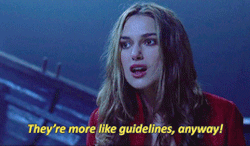Picture this: A swashbuckling pirate, a mythical sea creature known as the Kraken, a talking parrot, and really bad eggs. Sound familiar?
All of these ideas helped launch one of the most lucrative film franchises in Hollywood. Disney’s Pirates of the Caribbean was released in 2003 to widespread acclaim, catapulting the popularity of Johnny Depp as the central character, Captain Jack Sparrow. As Disney brought these ideas to life, several authors have claimed they wrote similar stories, and alleged Disney infringed on their copyrights when they released these films. A recent court case brings to our attention that, while several authors have brought copyright infringement lawsuits against Disney, many of them are quickly dismissed by the courts, and here’s why:
You cannot copyright ideas! Many of the complaints brought against Disney are for similarities in characters, settings, themes, dialogues, and so forth. But these elements are not protected under the idea/expression distinction in copyrighted materials. There’s a very good reason why ideas can’t be copyrighted. If authors/artists had exclusive ownership of ideas it would not allow others to create their own original works inspired by those ideas. After all, inspiration is derived from existing works and we would probably be missing out on some really great material. How do you think Pirates of the Caribbean even came about? Inspiration!
In the most recent case, Arthur Lee Alfred II v. The Walt Disney Company, brought in front of the District Court for the Central District of California, two authors alleged that Disney infringed on their copyright of a script they submitted to Disney about pirates. Disney passed on the screenplay and released their own version, Pirates of the Caribbean. The plaintiffs’ complaint alleged that the film was similar to their own work as to the plot: “Supernatural ‘cursed’ pirates or ‘skull faced’ pirates.”
The District Court ultimately held that the idea of cursed pirates is not protectable. The plaintiffs also alleged that the works are similar because they include, “treasure maps, ghost pirates, the ‘undead,’ the supernatural, ships flying black sails, skeletons, privateers, naval attacks, dark fog, the ‘pirate code,’ ghosts, and sea monsters.” But the court reiterated in their opinion that these alleged similarities are not protectable under copyright law because they are merely “familiar stock scenes, and characteristics that flow naturally from the works’ shared basic plot premise regarding pirates.”
It’s important for creators to understand the difference between ideas and the expression of those ideas. For example, anyone can write a story about a boy wizard but he just can’t be Harry Potter. Think of ideas, characters, themes, and generic plot lines as the guidelines to build the world that you are imagining, and it’s up to you to make the creative distinctions and fill in the gaps.
Written By: Julianna Salman
Source:

